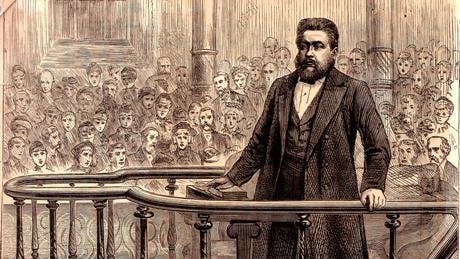
Spurgeon’s pastoral ministry was more than just preaching. With so much to do, he envied Daniel Rowland who “would have nothing to do with the management of the church… He kept himself to his preaching, came in through a door in the back wall of the meeting-house and disappeared suddenly when he had done.” A pastor in that situation “ought to preach like an angel.” This was not Spurgeon’s situation. He did not occupy a preaching station but pastored a church.
And yet, we should note that Spurgeon’s pastoral ministry was not less than preaching. Even with everything on his plate, he never failed in this most fundamental of pastoral responsibilities: to preach the Word. Spurgeon believed this to be true not only for himself but for all pastors. Spurgeon believed that the pulpit was “the Thermopylae of Christendom.” But in referring to “Christendom,” Spurgeon did not have any grand ideas about a Christian nation. Rather, he was referring to the local church. Just as the future of Greece depended on King Leonidas I in the Battle of Thermopylae, so Spurgeon believed that the health and unity of the church depended on the preaching of the Word. No matter how industrious of an administrator or counselor a pastor was, if he failed in his preaching, the church would also fail. At the pulpit, “the fight will be lost or won.” Therefore, Spurgeon charged his pastoral students that “the maintenance of our power in the pulpit should be our great concern, we must occupy that spiritual watch-tower with our hearts and minds awake and in full vigor.”
Throughout Spurgeon’s ministry, for a congregation of more than 5,000 members, the Metropolitan Tabernacle demonstrated remarkable unity. The church meeting minutes do not give any evidence of congregational infighting or disagreement with the elders. The church repeatedly affirmed their love and support for their pastor. The reason for this cannot be that Spurgeon always made the right decisions and pastored his church perfectly. Rather, if you were to ask him, Spurgeon would point to his preaching. Week after week, his congregation was “really fed” from God’s Word, and thus, they were satisfied and forgave “a great many sins.” Therefore, for the pastor, “pulpits must be our main care,” or everything else will fail.
As we will see, Spurgeon’s responsibilities as a pastor grew throughout his ministry. To help him with new members and pastoral care, Spurgeon led the church in calling men to serve as elders. To help him with the day-to-day pastoral and administrative responsibilities, he brought on his brother, James, to serve as his associate pastor. For all the various institutions and societies connected with the church, he relied on his deacons to assist him in his leadership. But when it came to the pulpit ministry of the church, Spurgeon alone took charge of the responsibility. He did most of the preaching, and when he was unable to preach, he arranged for pulpit supply from faithful preachers. This is not because he was territorial about the pulpit. Rather, Spurgeon understood that the heart of his pastoral calling was to responsibly give oversight to the preaching of the Word. The health and ministry of the church depended on this one thing, and he would not delegate that responsibility to anyone else.
As a result, Spurgeon felt the weight of responsibility in his preaching. The pulpit was his Thermopylae, and every sermon was a spiritual battle against the schemes of Satan. Because he preached so often and was so gifted, it would be easy to imagine Spurgeon growing comfortable with the task of preaching. This, however, was far from the case. Susannah, his wife, tells of the “soul-travail and spiritual anguish” that Spurgeon experienced during his sermon writing, not “in their preparation or arrangement, but in his own sense of accountability to God for the souls to whom he had to preach the gospel of salvation.” As his congregation multiplied and his sermons were being published around the world, Spurgeon felt the growing responsibility of each sermon. One friend tells how, in his earlier years, Spurgeon could not keep anything down before each sermon, in anticipation of the throngs who would gather to hear him. Only later in life would that physical struggle be overcome.
He did not, however, find this to be a deficiency. He once confessed to his grandfather about his physical and emotional struggles before entering the pulpit. His grandfather responded, “Be content to have it so; for when your emotion goes away your strength will be gone.” Though he preached thousands of sermons, Spurgeon never got over the weighty and awesome responsibility of preaching. “When we preach and think nothing of it, the people think nothing of it, and God does nothing by it.” As his ministry grew, Spurgeon did not coast in the pulpit but approached each sermon with trembling and prayerful dependence. This was his work as a pastor.
Excerpted with permission from Spurgeon the Pastor by Geoff Chang. Copyright 2022, B&H Publishing.